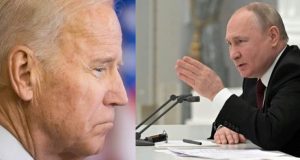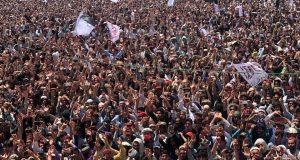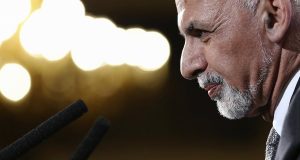 Abdul Ghafoor Liwal is an academic politician working for enlightenment and development of Afghan society for several years in Afghanistan. He has served on many governmental and non-governmental positions in Afghanistan. Mr. Liwal new book, ‘The Humanistic Politics in Afghanistan’ paves the way to critical thinking and helps in understanding the mindset of the present-day Afghan people. This book highlights the perspectives of the left and right wings in the light of Afghan society. This book also reminds the Afghan people of their mistakes of the past, and alerts them about the present-day challenges and tells them what lies ahead in the future.
Abdul Ghafoor Liwal is an academic politician working for enlightenment and development of Afghan society for several years in Afghanistan. He has served on many governmental and non-governmental positions in Afghanistan. Mr. Liwal new book, ‘The Humanistic Politics in Afghanistan’ paves the way to critical thinking and helps in understanding the mindset of the present-day Afghan people. This book highlights the perspectives of the left and right wings in the light of Afghan society. This book also reminds the Afghan people of their mistakes of the past, and alerts them about the present-day challenges and tells them what lies ahead in the future.
Mr. Liwal has adopted an approach comparatively different from traditional Afghans writers and he has gone through the indictment of the previous regimes. He doesn’t criticize but of course, he does highlight the failures and blunders of those people who were in the driving seat in the past, specifically, the human rights crimes as they committed against the people of Afghanistan.
In the chapter, ‘Forty Years of Meaningless Struggle for Peace’, he writes ‘We should consent that we are the victims of the external proxies, vested interests, strategies and policies, but the very burning question is this that does it help in forgetting our own mistakes and the internal factors that have made us a failed state? He adds, ‘We are responsible for what we couldn’t get through against the proxies through our national policies.’ On the next page, he brings into notice an excellent point while stating it as the question of ‘internationalization’ which could simply be defined as ‘The Islamic internationalization, “they think that the whole world only made for Muslims and the Afghans should also be sacrificed for this great cause. He also criticized ‘The philosophy of Marxism that has created the same problems in Afghanistan as did the religion.
The humanistic and nationalistic approaches have been removed from national politics of Afghan people, he says.
But in the next subtitle, ‘Lacking Rational Politics ’, Mr. Liwal adds, ‘We need to focus on the ‘Afghanism’ for promoting the national humanistic politics in Afghanistan’. The writer notes that decades of barbarism and wars have pushed four generations of Afghanistan toward fundamentalism while depriving them of the basic facilities, basic human rights and national constitution. He further adds, ‘The modern age only recognizes those nations and states that give importance to human rights, peace and prosperity and civilize their society as well. And he further asks, ‘The Afghans should go through introspection that where they are heading and what are they doing’?
The author excellently takes the view that the situations are also worst because of the unequal development across the country and he brilliantly gives the example of the gap between the city and village life, and asks, “Do we can claim that we are politically and strategically an independent nation without economic independence or do we need first economic independence”?
Mr. Liwal calls on the Afghans for sustaining freedom rather than fighting for freedom after each success. The author suggests few quick political steps for understanding the problems faced by Afghans people; first, ‘Awareness’, ‘Enlightenment’ and ‘Change.’ He states, ‘If the first two steps are successfully completed then automatically the nation will step in the third stage and the positive change will soon be the part of the progress of the nation. However, he cautions that these steps can only be applied by a proper leadership for a positive change.’
The rest pages of the book advise the Afghans to learn the philosophy of Khan Abdul Ghafar Khan ‘Bacha Khan’, who enlightened our national identity and led us to know how the enemy created a gap of leadership in Afghanistan through psychological warfare. He also tells the nation that ‘About hundred years ago, Bacha Khan had struggled against inequality, ignorance, inhuman acts and violence in the Afghan areas but unfortunately, the nation of the great political non-violent philosopher is in search of violence and lacks the important feature of leadership, unity and integration and they are still worst victims of hunger and deprivation as well as denationalization and denaturalization and with no clear vision.’
Referring to the statement of Bacha Khan, the writer notes, ‘Muslims are good and a great nation, but they are lacking leaderships, and look at the Hindu nation, they are having the leaders that care for the nationalistic feelings of their masses but the leaders of Muslims are landlords and the reputation is the aim of their lives.’
To emphasize the point, the author draws upon his perspective and writes, ‘We still don’t know that why we are the victims and being killed by the major powers for their vested interests and he specifies the names of the major powers, adding, ‘We need to understand the proxies of Pakistan, Iran, Russia and Britain that why they are dying for fighting their fight on our soil?’
In the chapter concerned with the mankind’s psychological disposition for fighting, the writer outstandingly explains the thirst of human for fighting. He describes different reasons behind the violence in the politics which includes ideology, religion, invasion of territories, psychological disorder, criminal purpose, terrorism etc. ‘The reasons are very vivid behind this violence, ‘political and economic success or suppression of the target population for their vested interest.’
In the chapter, ‘Psychological Warfare’, the writer states, ‘The reasons behind burning the holy Quran of the Muslims were not religious but political and the enemy was aware of the mindset of the Afghan youth that they wake up for revenge and they bring destruction to the national assets.’ Mr. Liwal also takes on the analysis of the Afghan media that how they played a negative role in promoting terrorism while broadcasting the images and movies of the terrorists by spreading a fear and terror in the society. He further points out, the unconstructive role of the religious players in the destruction of Afghan society.
Later, the author goes through the details of the history of academic and secular thoughts of the Afghan intellectuals and academics. He gives the example of an Afghan newspaper in the period of Amir Habibullah Khan, ‘Serajul Akhbar’, the newspaper had advocated for the human rights and economic independence of the Afghan people in 1903. The newspaper was of the view that the Europe is developing and moving toward industrial development and progress, so the Afghan people also need to adopt the same change and the new patterns of modern world.
Returning his attention to his actual topic, ‘Humanism’, the author stresses on the importance of humanism and calls it the most importance nucleus of all humanistic politics and praises all those theories that promoted the humanistic values in the Afghan society, however, he again lashed out at the previous regimes that made the big blunders in the life of Afghan people in Afghanistan.
The author proceeds to enumerate the importance of an Afghan state in which aesthetical, ethical, economic stability and equal rights are ensured besides the philosophical and psychological needs. Philosophically, he cites that how the human had gone through different tenures of evolutions that dictated past events and created cultural patterns through modern age. He strongly believes that the Afghan human should be given the priority based on his/her problems, whenever she/he encounters with and he/she should be given the capacity to get rid of the problems.
The rest parts of his book discusses the importance of the natural resources, ‘The Scope of Water in the Afghan Culture’, international relations of Afghan society, ‘The Problem of Afghan Society and its Relations with Europe in the period of Hamid Karzai, and he also discusses the role of ‘Civil Rights, Freedom of Speech, Free Media and The Challenges’ and finally, the author also comes with a conclusion on changes in the foreign policy of Afghanistan with other nations.
In the conclusion, we can say that this book provides a rational ability to the readers to understand Afghanistan’s contemporary period of politics and social movements as well as the importance of media and humanistic values. Mr. Liwal thoughts are well known for his standpoint of rejecting religious and leftist movements of past and introducing a new way as he calls it “The Third Way”.
Courtesy: AFGHAN TRIBUNE
THE PASHTUN TIMES
 Pashtun Times Latest News
Pashtun Times Latest News



